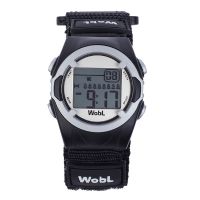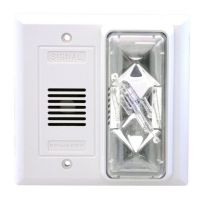 Written by Heather Collins, MSN, RN, CNOR
Written by Heather Collins, MSN, RN, CNOR
As an increasing number of people face hearing loss, it becomes crucial to have alarms that cater to their needs. Approximately 15% of American adults have hearing loss, and traditional audible alarms may not effectively alert them during emergencies such as fires, burglaries, or severe weather. To ensure safety, it's important to choose the right alarm specifically designed for deaf individuals.
There are several options for deaf alarms, including visual alarms with flashing lights, vibrotactile alarms that shake, and auditory alarms with higher volume and lower frequency sounds. To find one that works for you, check out our selection of patient safety alarms, which offer a variety of options to fit different preferences and needs.
Keeping your deaf loved one safe is a top priority, especially during emergencies. Many home safety features, such as smoke detectors, fire alarms, or carbon monoxide detectors, rely on audible cues to alert individuals. However, for deaf individuals, traditional audible alarms may not effectively provide the necessary warnings.
To ensure that your deaf loved one is adequately protected, it is important to choose alarms specifically designed for deaf individuals. These alarms typically use one or more signals, including visual signals with bright flashing lights, vibrotactile signals with vibrating or shaking components, and auditory signals with increased volume and lower frequency sounds.
.jpg)
Alarms can be critical in alerting deaf individuals to unexpected events such as fires, burglaries, and other emergencies. Traditional audible alarms may not effectively provide the necessary warnings for deaf individuals. Therefore, it is important to choose alarms specifically designed for the deaf community.
In addition to emergency alarms, communication, and scheduling alarms, such as doorbell systems and alarm clocks, can help deaf individuals establish stability and independence in their daily lives.
Alarms can also be used to warn deaf people of impending bad weather. Traditional weather alerts may not effectively provide necessary warnings to people who cannot hear thunder.
To address this issue, deaf-specific weather alarms use visual or vibrotactile signals to alert them of severe weather conditions. These alarms can be set to provide notifications for specific weather events such as hurricanes, tornadoes, and severe thunderstorms.
Flashing lights, for example, can effectively alert people sleeping in another part of the house. Vibrotactile alarms, such as bed shakers, can also warn people in deep slumber about bad weather.
Communication assistance alarms help deaf individuals establish stability and independence by providing the necessary alerts for communication and caregiving needs. Doorbell systems, for example, can alert individuals when someone is at the door. These systems use visual signals, such as flashing lights, or vibrotactile signals, such as bed shakers, to alert individuals. This can provide peace of mind and help individuals maintain their independence by not having to rely on others to know when someone is at the door.
Similarly, home phone alert systems can alert individuals when someone is calling their home phone. These systems also use visual or vibrotactile signals to alert individuals.
Another important alert for young deaf parents is a baby cry signaler. These alarms also use visual or vibrotactile signals to alert parents when their baby is crying, allowing them to respond quickly and provide the necessary care.
Schedule and routine alarms assist deaf people in maintaining their daily schedule and staying on track with appointments and activities. Alarm clocks with visual or vibrotactile signals assist people in getting up at a consistent time each day. Bed shakers and vibrating watches can also function as good alarm clocks. Additionally, timers may be helpful while doing things like cooking or exercising. These alarms are great for establishing routine and independence in daily life.
Bed shakers are very effective at waking deaf individuals up and can be used as routine morning alarms or emergency alerts. Bed shakers work by vibrating the bed, allowing individuals to be alerted even if they are sleeping soundly. These alarms provide a safe and reliable way for deaf individuals to be alerted in the event of an emergency or to start their day on time.
Best: Sonic Alert Clock with Bed Shaker and Phone Signaler
Strobe lights are intense enough to wake someone sleeping, making them an effective solution for emergency alerts or morning alarms. Strobe lights can be used bedside or as door alarms, providing a convenient and reliable way for deaf individuals to be alerted. With their bright flashing lights, strobe lights can effectively alert deaf individuals even in a deep sleep.
Best: Smoke Alarm with Strobe Light
 | MaxiAids WobL 8 Alarm Vibrating Reminder Watch View Product |
Vibrating alarms are commonly worn as a watch or similar device and provide a tactile alert. Vibrating alarms work by vibrating or shaking, alerting individuals even if they are sleeping soundly or in a different part of the house. These alarms provide a convenient and reliable way for deaf individuals to be alerted for routine activities, such as appointments or emergencies.
Best: WobL 8 Alarm Vibrating Reminder Watches
 | Loud Alarm and Strobe Doorbell Signaler by United TTY View Product |
Extra loud alarms are a type of auditory alarm. These alarms are made with a high decibel to ensure that people with hearing loss can hear them. These alarms provide a convenient and dependable way for people with limited hearing to be alerted in emergencies like fires or burglaries and for routine activities like appointments. With their increased volume, extra loud alarms are an effective solution for those with hearing loss.
Best: Loud Alarm and Strobe Doorbell Signaler by United TTY
Don’t let limited hearing hold you back. Empower yourself or your loved one with the ultimate safety and security solution. Explore our selection of alarms for the hearing impaired and ensure their safety and independence in any situation.
Additionally, visit Caregiver University for more resources and support for caregivers, providing helpful information and guidance on caring for loved ones with hearing loss.

Heather Collins, MSN, RN, CNOR
Heather is a registered nurse and freelance health writer with a Master's degree and over 24 years of nursing and leadership experience. Heather cares for patients of all ages in various healthcare settings, including inpatient acute care nursing, GI procedural nursing, cardiac lab, infertility clinics, pediatrics, and surgical services. Heather is dedicated to providing high-quality care and sharing reliable, evidence-based information that empowers people to make informed decisions about their and their loved ones' health.